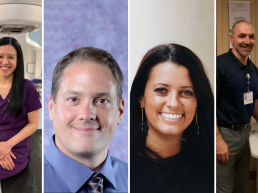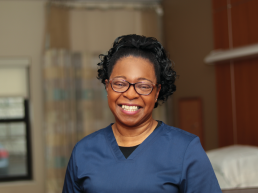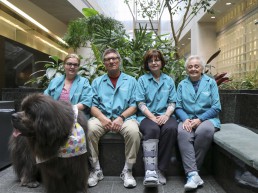“The most powerful moments of our lives happen when we string together the small flickers of light created by courage, compassion, and connection and see them shine in the darkness of our struggles.” — Brené Brown
Caring & Listening. Two core values of UPMC. Two actions that turned my life around. Two principles that give me purpose and hope in my role as a peer specialist with UPMC.
My name is Jennifer Silbaugh, and I am a peer specialist at Western Psychiatric Institute and Clinic of UPMC.
I came into this role because I am a person who lives with a mental health diagnosis. People who have a diagnosis and work in the field are called peer specialists. I work at WPIC in the Diagnostic Evaluation Center (DEC), where I was treated many times. The DEC provides emergency and crisis intervention services to people of all ages 24 hours a day, including psychiatric, emergency, and substance abuse evaluations; walk-in crisis therapy; referral to outpatient providers; and facilitation of inpatient admissions.
I love my job because I get to be a part of UPMC’s mission to support people in recovery, like me. Being a peer specialist is both challenging and rewarding at the same time. At first, working in the same hospital where I received treatment was challenging, because I associated it with being in crisis. But now, several years into my journey, it’s been very rewarding to show the staff how far I’ve come and to know that they are inspired by seeing the outcome of their support and care. It is a powerful thing to allow the staff to recognize that their jobs are meaningful and that their acts of Caring & Listening made a difference in my life. Now I have the chance to show Caring & Listening to someone else and be part of their journey to recovery, just as others did for me when I was a patient at WPIC.
“I am grateful to meet and work with such strong, courageous individuals on a daily basis…I couldn’t see myself doing anything else but this — this position created hope for me.”
A major component of caring that guides my work at the DEC is treating people like I would want to be treated.
One day, a woman came in for an evaluation. I noticed her crying uncontrollably in the waiting room as she sat alone. I introduced myself, explained my role, and sat down with her, and she trusted me enough to allow me to listen to her story. She had lost three close family members within the past month and was overwhelmed with sadness. Shedidn’t know how to move on. I held her hand and passed her tissues. It seemed as if she was at an all-time low. We had shared similar feelings of loss, and I let her know she could get through this. I told her she was not alone.
She turned to me and let me know she was going to be all right. She said, “That’s all I needed. I had no one else to talk to, but you listened. You helped me more than any doctor can.” She asked if she could leave even before her evaluation. She was discharged and left, confident that she could carry on with her life.
I am grateful to meet and work with such strong, courageous individuals on a daily basis. Sometimes I get caught up in the daily bustle of life, as we all do, but I always remember what I am grateful for. I couldn’t see myself doing anything else but this — this position created hope for me. UPMC gives me the opportunity to use my pain as my power. Nothing feels more rewarding to me than helping others find hope in the darkest of places.
UPMC is where I share mine.
—Jennifer Sillbaugh, Peer Specialist, Western Psychiatric Institute and Clinic of UPMC
Explore positions as a Peer Specialist on the UPMC Careers site, where new jobs in a variety of fields are listed every day!




